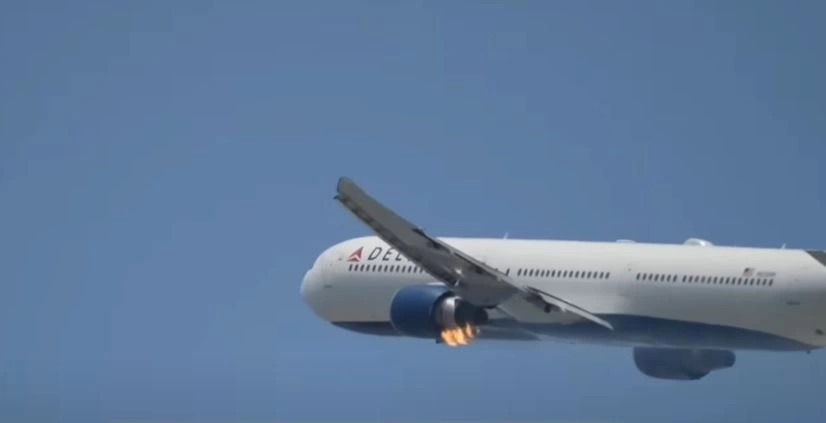Delta Air Lines Boeing 767 Engine Catches Fire Soon After Takeoff in the United States.
During a regular flight between Atlanta, Georgia and Paris. Delta Air Lines had a harrowing experience when one of the engines of its Boeing 767 plane burst into flames after takeoff. The incident, which happened on the night of July 15, 2025 has caused alarm regarding the safety procedures of commercial flights, the maintenance of older plane models, and the adequacy of emergency response measures.
Thinkbrief
7/20/20252 min read


On the night of July 15 2025 a routine flight from Atlanta Georgia to Paris France quickly became a terrifying experience when the engine of Delta Air Lines’ Boeing 767 caught fire shortly after takeoff. The plane had just reached 3,000 feet when the crew noticed a problem with the left engine. Within minutes air traffic controllers saw the engine spitting out thick dark smoke followed by bursts of flames that lit up the sky. The pilots acted fast to maneuver the plane back to Hartsfield-Jackson Atlanta International Airport for an emergency landing. What should have been a smooth flight turned into a chaotic scene. Passengers were shaken by the sight of flames coming from the wing while the crew worked swiftly to keep everyone calm. Despite the panic many passengers later said the flight attendants were composed and professional as they prepared everyone for a possible emergency landing. One passenger Emily Richardson described it as surreal but praised the crew for their calm presence during the ordeal.
When the plane returned to the airport about 40 minutes after the fire started the emergency responders were already on standby. Firefighters quickly reached the plane as it came to a complete stop but thankfully there were no injuries among the 200 passengers and 12 crew members. The Federal Aviation Administration (FAA) and the National Transportation Safety Board (NTSB) launched an investigation into the cause of the fire. Preliminary reports suggested a malfunction in the engine’s fuel system but no official conclusions have been reached. Aviation experts have pointed out that if the fire had not been controlled so quickly the situation could have turned into something far worse. Delta Air Lines quickly reassured the public by emphasizing their commitment to passenger safety and the professionalism of their crew and emergency teams. The airline CEO Ed Bastian expressed relief that no lives were lost and confirmed that they were working closely with authorities to figure out what caused the incident.
This event has sparked renewed conversations about the safety of older aircraft. The Boeing 767 while still a reliable plane is nearing 30 years in service. Some experts argue that while these planes undergo thorough maintenance as they age there’s an increasing risk of mechanical failures. The incident highlighted how vital it is to balance maintenance costs with the risk of potential issues as these older aircraft continue to operate. Even though newer and more fuel-efficient models like the Boeing 787 and Airbus A350 are now the standard many airlines including Delta continue to use older planes on transcontinental routes. The crash has made people question whether older planes should still be used for long flights given that they could face more technical issues as they age.
Despite the terrifying nature of the incident it’s a reminder that air travel remains one of the safest modes of transportation. The flight crew’s quick thinking and the efficiency of emergency responders at Atlanta’s airport proved that the aviation industry is well-prepared for crises like this one. The swift response helped prevent what could have been a major disaster from escalating further. However the event serves as a wake-up call for the aviation industry to remain vigilant when it comes to safety. The investigation into the fire continues and while no one was harmed the incident has raised important questions about the safety of older planes and how to improve maintenance practices going forward. It’s clear that while accidents of this nature are rare there is always room for improvement to make flying safer